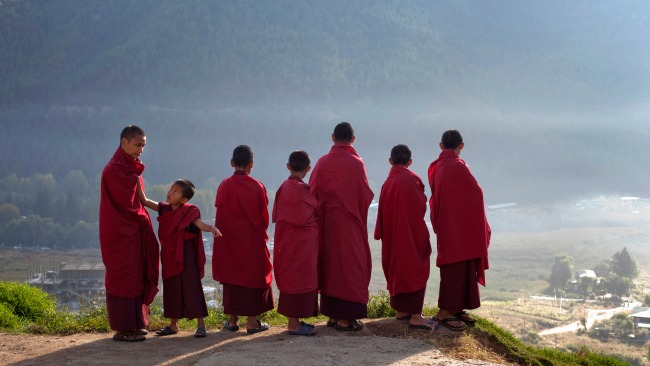Should Governments Try to Make Us Happy?
Recent reports expose cracks in Bhutan's strategy of promoting contentment, not income.

When a Guardian journalist visited Bhutan recently, the country’s “mystical” quotient did not disappoint. Among other things, the writer noted “men and women laboring in song,” a woman “scampering around churning a pot of yak butter tea,” and the “sound of mule bells ringing in the valley.” As he reaches the remote mountain home of a local herder, the man quips, as though starring in a tourism commercial, "You know, happiness is a place."
Indeed, it’s a rare Bhutan story that doesn’t mention how irrepressibly joyous the country is.
In place of speed-limit signs, another Guardian piece notes that drivers in Bhutan are met with placards reading, "Life is a journey! Complete it!" or "Let nature be your guide.”
The recently released 2013 UN World Happiness Report devotes a sizable section to Bhutan, attempting to quantify the happiness levels of the only country that prioritizes contentment over income.
The country’s 1729 legal code stated that, “if the Government cannot create happiness for its people, there is no purpose for the Government to exist.” In 1972, this sentiment was codified when Bhutan’s King, Jigme Singye Wangchuck, instituted a “Gross National Happiness” as its official measure of progress, superseding the more traditional Gross National Product in importance. The country’s constitution directs the state “to promote those conditions that will enable the pursuit of Gross National Happiness.”
“We know that true abiding happiness cannot exist while others suffer, and comes only from serving others, living in harmony with nature, and realizing our innate wisdom and the true and brilliant nature of our own minds,” the prime minister said in 2008.
Happiness in Bhutan, the UN report explains, is reached when people achieve “sufficiency” in at least four domains, which together encompass 33 indicators that range from housing quality to time spent sleeping to cultural participation. Here’s why that last one is important, via the World Happiness Report:
The World Happiness Report authors think Bhutan can be a model for the way other nations track their progress:
“Bhutan is on to something path breaking and deeply insightful,” they write.
But looking at the data, it’s not clear that all Bhutanese are reaping the benefits of this strategy. The GNH poll found that 49 percent of Bhutanese men are happy, while only one-third of women are, “a result that is both striking and statistically significant.”
And despite the intensive focus on merriment, Bhutan isn’t as happy as most European countries surveyed in the report (they’re the happiest in the world), though it is happier than its neighbors, Nepal, China and Bangladesh.
A look at the country's “unhappy” people further reveals how unevenly happiness is distributed in Bhutan. In fact, it looks much like you’d think contentment would present itself in a developing country: Those with economic and educational opportunities are glad; those that lack them aren’t. Here’s the World Happiness Report:
This fits with existing research showing that richer, better-educated people are happier, in every country, regardless of whether it installs cheery road signs or ensures its people have access to the right ceremonial garb.
Now, even Bhutan is beginning to acknowledge that simply emphasizing happiness doesn’t translate to people living better lives. As Bhutan has progressed from a hermetic kingdom to a more developed nation, it has seen a rise in other symptoms of modernity, as well—drugs, gangs, and unemployment. With that has come an increase in mental illness, as the Toronto Star reported earlier this week, which is treated by the country’s sole psychiatrist.
“Liver disease caused by alcoholism has become Bhutan’s number one killer,” the Star writes, and many young Bhutanese are hooked on painkillers.
The authors of the Happiness Report also found that although most Bhutanese enjoy “sufficiency” in domains like value, safety, languages, family, and urbanization, less than half of Bhutanese have sufficient “literacy, housing, donations, work, services, schooling, cultural participation, and knowledge.” A quarter of Bhutanese live in poverty, and 70 percent lack electricity.
Perhaps because of these shortcomings, Bhutan seems to be pivoting away from GNH and toward more traditional measures of success, like incomes and education.
In the country’s July elections, former prime minister Jigme Thinley was defeated partly because he was seen as aggressively promoting the country’s GNH campaign abroad rather than focusing on domestic concerns. New Prime Minister Tshering Tobgay has said that while “economic growth is not the be-all and end-all of development, if the government of the day were to spend a disproportionate amount of time talking about GNH rather than delivering basic services, then it is a distraction.”
“There are four issues that can compound to make matters extremely bleak,” he continued. “Our ballooning debt that if we're not careful will not be sustainable; the big rupee shortage; unemployment, in particular youth unemployment; and a perception of growing corruption.”
Does this mean Bhutan should just count up cash rather than good vibes? Maybe not. But in a way, many of Bhutan’s GNH measures, like health or “knowledge,” would improve as the country gets richer and develops better infrastructure, anyway. Tracking happiness alongside income makes sense, especially if it helps expose inequalities that might be masked by an overall growing GDP. But it seems that in Bhutan’s case, the problem is that the metric became more of a PR campaign than a development strategy.